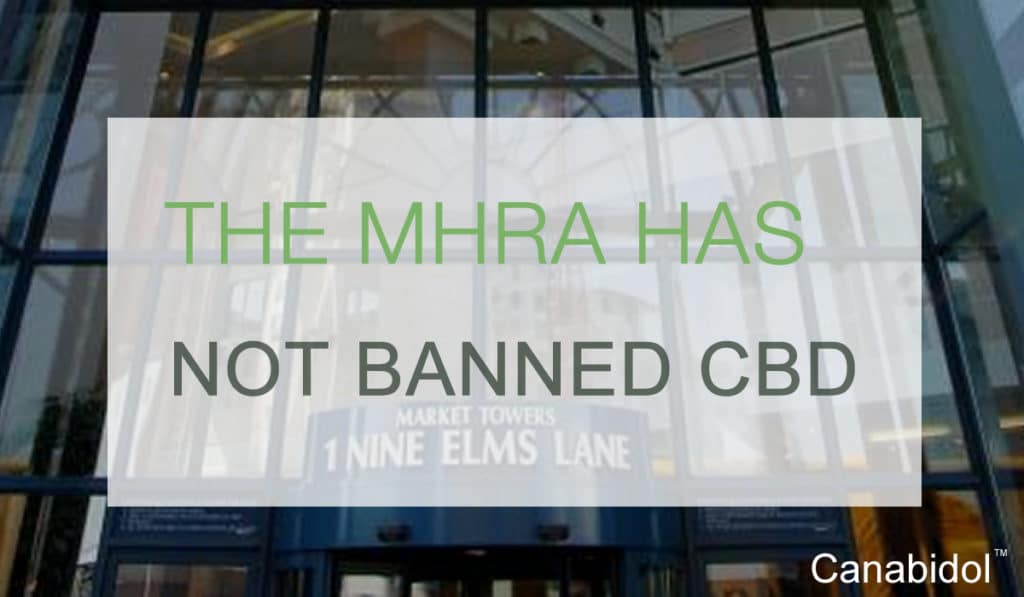

You may have been made aware of a statement that has been circulated by the media, that the MHRA has made regarding Cannabidiol (CBD) and that CBD will be classed as a medicine from November.
The Medicines and Healthcare Products Regulatory Agency (MHRA) apparent decision to designate Cannabidiol (CBD) as a medicine and impose a blanket ban of all CBD products is “an unholy mess and has been handled about as badly as it is possible for a government agency to deal with a matter of public safety.”
Their statement indicates that they have come to the opinion that products containing CBD are a medicine and those that are for therapeutic use must have a medicines licence before they can be legally sold.
We manufacture hemp products that are not for therapeutic use which contain CBD and have not received any correspondence from the MHRA regarding this matter. However we have been contacted by many of our customer who are concerned that this is a complete ban on all CBD products from November.
We would like to take this opportunity to clarify the specifics surrounding the legality of the sale of CBD and why the MHRA do not have the authority to impose a blanket ban on Cannabidiol.
The legal requirements for food and foodstuffs are that they are governed by Regulation No. 178/2002 (the “Food Regulation“); medicinal products are specifically excluded under Article 2. The Food Supplements Directive 2002/46/EC defines a food supplement as foodstuffs which supplement a normal diet and which are concentrated sources of nutrients or other substances with a nutritional or physical effect (Article 2). Nutrients are defined as vitamins and minerals as listed in Annex I in the forms listed in Annex II to the Food Supplements Directive. Cannabidiol does not fall within this list and being categorised as an “other substance” is therefore subject to national law (which must comply with the Food Supplement Directive). Under Article 6(1) and (2), food supplements must be labelled as such and must not be labelled, presented or advertised as ‘preventing, treating or curing a human disease’.
It is determined by case law that the MHRA is required to apply the multi-factorial test set by the CJEU in HLH Warenvertriebs GmbH (para 30, [2005] ECR I-5141) which stated that for the purposes of determining whether a product must be classified as a medicinal product or as a foodstuff, the competent national authority must decide on a case-by-case basis, taking account of all of the characteristics of the product, in particular its composition, its pharmacological properties (to the extent scientifically known), the manner in which it is used, the extent of distribution, its familiarity to consumers and the risks which its use may entail.
The CJEU case law suggested that it was the purpose for which a product was used and/or marketed which was often a critical factor in distinguishing between medicinal and non-medicinal products. The (functional limb) covered products whose pharmacological properties had been scientifically proven to have physiological effects. However, such physiological effects were not specific to medicinal products but were also among the criteria recognised within the definition of food supplements. Thus to fall within the functional limb, the criteria extended beyond mere health benefits, a product must treat or prevent disease. Products could not be classified as medicinal on a ‘blanket’ basis under the functional definition of medicinal product. The approach must be proportional. The fact that some hemp products are classified as medicinal products does not mean that all other hemp products containing an identical substance and mode of action must also be classified in the same way. The multi-factorial test involved the application of complex factual and scientific considerations by the MHRA, particularly in respect of ‘borderline’ products.
In accordance with the judgement on Commission of the European Communities v Federal Republic of Germany (C-319/05) . Hemp products whose effect on physiological functions is no more than the effects which a foodstuff consumed in a reasonable quantity may have on those functions, does not have a significant effect on the metabolism and cannot, therefore, be classified as a product capable of restoring, correcting or modifying physiological functions within the meaning of the second subparagraph of Article 1(2) of Directive 2001/83. Because the mentioned risks and contra-indications related to taking hemp preparations are limited and, more importantly, are no different from those linked to taking hemp as a foodstuff, such a preparation cannot be classified as a medicinal product by function within the meaning of the second subparagraph of Article 1(2) of Directive 2001/83. We accept that defining a given product and the interpretation of the classification rules is a matter for the MHRA. The MHRA guidance on classification focuses on the presentational and functional tests, as set out in the definition of medicinal products and this approach has generally been accepted by the English Courts. However, the classification can be very complicated, based on a detailed assessment of the product and the claims made about it, and is a mixture of factual and scientific considerations. In a recent case, the MHRA emphasised the fact that it assesses each product on a case-by-case basis, taking into account the totality of the factors set out in the guidance, and the Court accepted that products should not be classified as medicinal on a “blanket” basis, or based on one criterion alone. It will also be relevant which “borderline” is being considered (for example, with food, or with medical devices) and the precise definitions of the relevant products. As a result, there is the potential for different determinations to be made for similar products, depending on the precise composition of the product, and the claims made about it.
Several substances contained in foods (such as garlic) have physiological effects, but it is not appropriate to treat all products having such effects at certain doses as medicinal, where the amount absorbed is no different from that which would be absorbed as part of a normal diet.
WHAT DOES THIS ALL MEAN?
Essentially the MHRA can not lawfully impose a blanket ban on all CBD products. They must look at each product on a case by case basis, and must consider all of the characteristics of the product, in particular its composition, its pharmacological properties (to the extent scientifically known), the manner in which it is used, the extent of distribution, its familiarity to consumers and the risks which its use may entail.
The information circulating in the media regarding the ban on CBD has originated from a letter that was sent out to some CBD companies that had been making medical claims about CBD and which were therefore in breach of the medicines act. No public statement has been issued by the MHRA and anything you have seen in the press is from responses to individuals.
We have never made any medicinal claims, or for that matter ever referenced any medical conditions or presented our products as having any medicinal benefits.
Canabidol™ products are food supplements and are not classed as medicines. As no determination in relation to our products have been provided by the MHRA, they can be lawfully purchased as food supplements. We consider any attempt to classify our food supplements as medicines would have no legal basis, as our products effect on physiological functions is no more than that of the effects which a foodstuff consumed in a reasonable quantity would have.
In conclusion there is not a ban on all CBD products and CBD sales will continue as normal for companies that have acted lawfully in representing this food supplement as a food supplement and not a medicine.
Share with
Sign up to get all the latest tips, news and promo from CBD by BRITISH CANNABIS™ delivered right to you.
Sign up to get all the latest tips, news and promo from CBD by BRITISH CANNABIS™ delivered right to you.
Sign up to get all the latest news and promo from CBD by BRITISH CANNABIS™ delivered right to you. *Get your FREE CBD GUIDE now to complete your subscription.
CBD by BRITISH CANNABIS™
Overland House, Ashville Way, Wokingham, RG41 2PL, United Kingdom
Copyright BRITISH CANNABIS™ 2025

